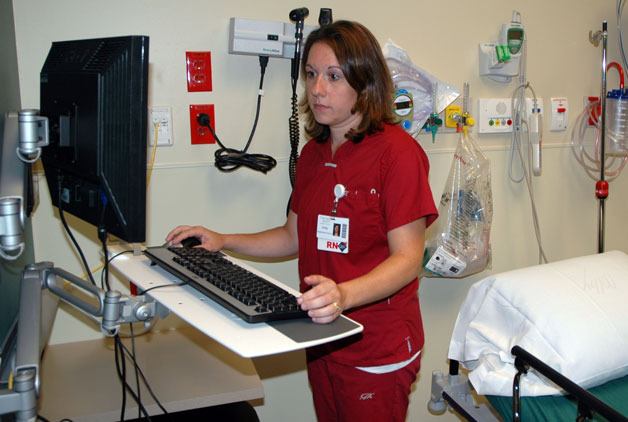ARLINGTON — Kelly Boardley, a registered and certified emergency nurse at Cascade Valley Hospital, has made it her mission to educate the surrounding community about the dangers of stroke and how to respond to them.
Boardley serves as the stroke and cardiac coordinator for Cascade Valley Hospital, which has been designated a Level 2 Cardiac Care Center and a Level 3 Stroke Care Center by the state of Washington’s Emergency Cardiac and Stroke System. She’s also spoken to community groups ranging from the Stillaguamish Senior Center to the Arlington-Smokey Point Chamber of Commerce about how to spot the signs of stroke in time for them to be treated at Cascade Valley or another hospital such as Harborview Medical Center, with which Cascade Valley Hospital is affiliated for stroke care, to access their consultants’ input in real time.
“A lot of times, people will notice some symptoms and think they’ll go away, but early intervention is necessary and not something you can put off,” said Boardley, who summarized a checklist of potential signs of stroke under the acronym FAST — facial droop, arm drift, slurred speech and timing. “These symptoms can vary, but if it’s suddenly hard for you to find the right words, or you feel a sudden weakness in your arm, then you can’t ignore it. We say that ‘time is brain,’ because your brain cells are dying during a stroke, and after three and a half to four hours, we’re not able to treat it.”
Those who spot the FAST signs of stroke in themselves or others are advised to call 911. Boardley explained that dispatchers will alert EMS responders to the fact that it’s a possible stroke, and after the EMS responders have done their own assessment, they’ll call it in to the hospital, which will have a team waiting to treat stroke when the patient arrives.
“The risk factors for stroke are the same as those for a number of other ailments,” Boardley said. “High cholesterol or blood pressure levels, diabetes, an irregular heartbeat, obesity, a lack of exercise or a family history of stroke are all indicators. Even if you’ve never suffered any symptoms, family history alone is a huge indicator.”
In addition to letting their primary care providers know about any of these indicators and taking steps to treat them, Boardley warned against dismissing stroke as a condition that only affects the elderly.
“It impacts all walks of life,” Boardley said. “Any sudden or acute change, such as someone’s face suddenly becoming droopy, shouldn’t be blown off. There’s no age limit to stroke.”
Boardley was personally impacted by stroke when her grandmother attended her RN graduation and collapsed while cooking dinner for the family.
“She was unable to speak or move her right side,” Boardley said. “Back then, we didn’t have the tissue plasminogen activator, which dissolves blood clots, so she died. Her death could have been prevented if it had happened now, so I don’t want anyone else to lose a loved one to stroke.”
Although Boardley characterized the current state of stroke care as similar to where cardiac care was 20 years ago, she expressed enthusiasm for the number of new discoveries that are being made in the field, on an almost daily basis.
In addition to speaking to various local nursing homes and assisted living centers, Boardley is set to speak to the Rotary Club of Arlington about stroke on Valentine’s Day of next year. To schedule a time for Boardley to visit with and speak to your group about stroke, call Cascade Valley Hospital Community Relations at 360-618-7849.








